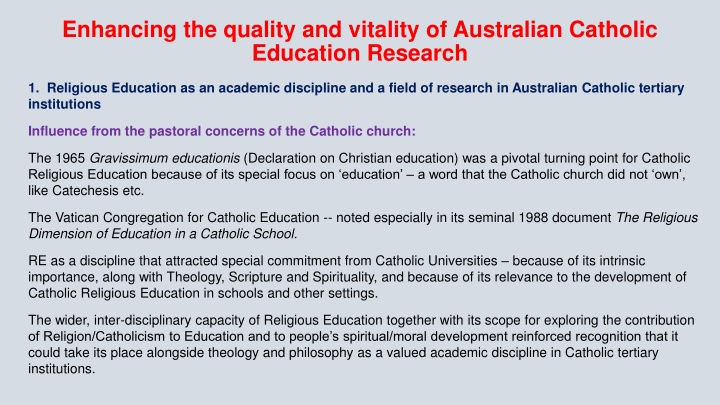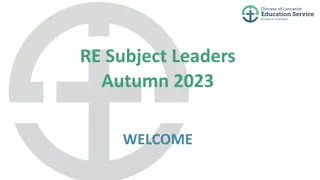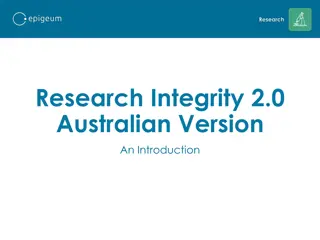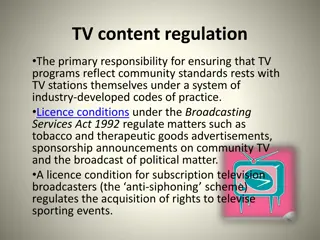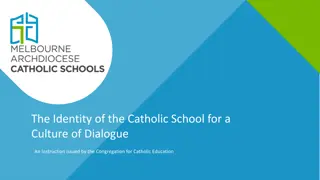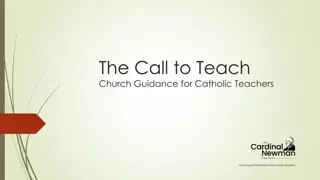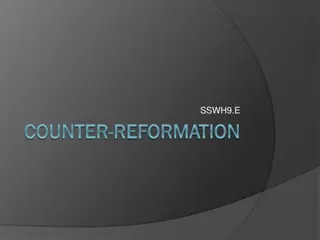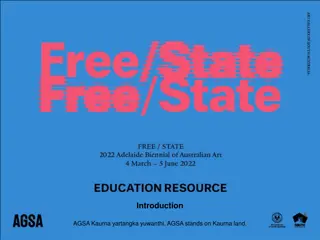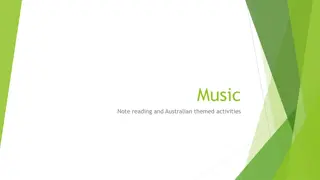Enhancing Australian Catholic Education Research: Influences and Evolution
Religious Education as an academic discipline and field of research in Australian Catholic tertiary institutions has evolved significantly, influenced by past declarations and wider educational paradigms. The discipline draws from various fields, including theology, philosophy, psychology, and sociology, to explore spiritual, moral, and religious education in contemporary globalized societies. Embracing interdisciplinarity, Religious Education in Australian Catholic institutions aims to enrich educational practices and cater to diverse socio-cultural contexts.
Download Presentation

Please find below an Image/Link to download the presentation.
The content on the website is provided AS IS for your information and personal use only. It may not be sold, licensed, or shared on other websites without obtaining consent from the author.If you encounter any issues during the download, it is possible that the publisher has removed the file from their server.
You are allowed to download the files provided on this website for personal or commercial use, subject to the condition that they are used lawfully. All files are the property of their respective owners.
The content on the website is provided AS IS for your information and personal use only. It may not be sold, licensed, or shared on other websites without obtaining consent from the author.
E N D
Presentation Transcript
Enhancing the quality and vitality of Australian Catholic Education Research 1. Religious Education as an academic discipline and a field of research in Australian Catholic tertiary institutions Influence from the pastoral concerns of the Catholic church: The 1965 Gravissimum educationis (Declaration on Christian education) was a pivotal turning point for Catholic Religious Education because of its special focus on education a word that the Catholic church did not own , like Catechesis etc. The Vatican Congregation for Catholic Education -- noted especially in its seminal 1988 document The Religious Dimension of Education in a Catholic School. RE as a discipline that attracted special commitment from Catholic Universities because of its intrinsic importance, along with Theology, Scripture and Spirituality, and because of its relevance to the development of Catholic Religious Education in schools and other settings. The wider, inter-disciplinary capacity of Religious Education together with its scope for exploring the contribution of Religion/Catholicism to Education and to people s spiritual/moral development reinforced recognition that it could take its place alongside theology and philosophy as a valued academic discipline in Catholic tertiary institutions.
Influence from a confluence of concerns from wider inter-denominational, inter- religious, religion studies and public education domains: USA and Canada 1906 The REA launched the academic journal Religious Education. It still services the REA of the United States and Canada with a world-wide readership. While primarily concerned with adult Religious Education and pastoral ministry in the Christian churches, the REA readily included participation from Catholic, Jewish, Muslim educators and others and from Religion Studies. 1903 REA convention. John Dewey keynote address on the relationship between religion and education 1903 William Rainey Harper founded the Religious Education Association
United Kingdom: 1944 RE a key compulsory subject in the public school curriculum. Accepted part of general educational discourse and academic research. Europe: RE also well established in educational and religious discourses. Varied school contexts. Fluidity and flexibility: RE as a discipline adapted to meet the needs of new contexts and socio-cultural changes. Different definitions of its nature and purposes. Following: One example of an Australian definition of Religious Education as an academic discipline and field of research
Religious Education is an academic discipline and a field of research which is primarily interdisciplinary. It was based initially on the relationship between religion and education, and in religious institutions on the relationship between education and theology. Religious Education draws on various disciplines in its investigations including education, history, theology, philosophy, psychology and sociology. Religious Education is the discipline whose focus is what it means to educate people spiritually, morally and religiouslyin today s globalised, mainly capitalist and consumer oriented countries, which exhibit various degrees of secularisation. In Australian Catholic institutions it is specially concerned with all aspects of education for handing on the Catholic religious tradition and promoting the personal, spiritual and religious development of people, particularly young people in Catholic schools as well as for Catholic children in public schools. It is a discipline committed to the service of Australian Catholic education. There is a prominent focus on spirituality as a construct which was originally religious but which now has a broader connotation, covering the contemporary search for meaning and values in a secularised culture. This includes study of cultural factors that can influence personal development as well as aspects of contemporary education such as equality, environmental and sustainability concerns.
2. Enhancing the quality of research supervision Developing a critical research perspective Homiletic speech and the language of research and the academy. Never stop trying to improve the quality of one s academic writing. Self scrutiny. ICT aids to improving quality and efficiency Web material on skills and issues in research supervision. 3. A critical period for the future trajectory of Catholic school religious education The discourse of RE is made up of the words and ideas used by educators to articulate underlying assumptions, purposes and practices, and for the evaluation and development of the discipline. A synonym for the discourse is the narrativefor RE where the nuanced connotation refers to the story line that is used to give an account of RE, its history and progress, how it is understood today and how it might change and develop in the future.
The Church documents and religious education theorists have many important things to say about making catechesis more effective and life relevant. This contributes to the Ministry of the Word (1971). By making use of Groome's (1980) present dialectical hermeneutics (an aspect of Shared Christian Praxis) together with Moore's (1981) typological phenomenology, and taking into account developmental theory, it is possible to facilitate the faith development of pupils from an intuitive-projective stage to a synthetic-conventional stage (Fowler, 1981). There may also promote individuating-reflexive or paradoxical-consolidative faith. However, this does not resolve the question: To what extent can an education in religion contribute to an education in faith? The use of Grimmitt's (1973) dimensional and existential approaches (that is, covering explicit and implicit religion respectively), may serve as a pre-catechesis and also as a pre-evangelisation. This was an alternative to using Smart s (1968) six dimensions to religion approach. Furthermore, the initiation of young people into the evangelising interpersonal interactions of the faith community would constitute the catechumenal dimension of the R.C.I.A. (Rite of Christian Initiation of Adults). These same processes would effect a degree of secondary religious socialisation, and no doubt this would serve the purposes of evangelisation and inculturation into the faith (1976). This would invariably constitute a faith formation and it would communicate and reinforce Catholic identity (2005). It is also suggested that a liberational approach will help with the process of conscientisation, or raising of critical consciousness. This will challenge young people to be Christian witnesses and will effectively provide a dimension of mission which is more effective than that of a Kerygmatic approach or of a life-situation catechesis. Lombaerts earlier Dialogical Hermeneutic Competence theory (DHC, 2000), had parallels with the Psychotherapeutic Model of Religious Education (Brink, 1977); recently it has been resurrected as the (HCM) Hermeneutic Communicative Model. Perhaps this last development will solve many problems for RE. (Anon. 1983, with a recent updates).
Why attention to the language in the narrative of RE is important The language of Religious Education structures the discussion of the subject. In effect, it determines many of the possibilities that will emerge; it has a formative influence on teachers expectations and on what and how they teach; it influences presumptions about the types of responses they will seek from students; it provides criteria for judging what has been achieved; it influences teachers perception and interpretation of problems in religious education; it even influences the way teachers feel about their work Am I a success or a failure? This language can be oppressive if it restricts religion teachers to limited or unrealistic ways of thinking and talking about their work. (1985, from Teaching Religion in Catholic Secondary Schools)
Identifying the problem of ecclesiastical drift in Religious Education Ecclesiastical drift is said to occur where the discourse of RE has gradually and incrementally come to be dominated almost exclusively by constructs like faith development, faith formation, Catholic identity, new evangelisation and Catholic mission. There is evidence (in diocesan and school documents/websites and in the re-naming of former diocesan RE departments, as well as in new religious leadership roles in Catholic schools) that these ecclesiastical terms have been replacing the word Religious Education. Issues Excessive use of ecclesiastical language, at the expense of the word education, turns the focus inwards towards Catholicism at the very time when more of an outwards focus on the shaping influence of culture is needed. Ecclesiastical language dominance eclipses the educational dimension to Religious Education and what suffers is thinking about what it means to educate today s young people spiritually and religiously. If students, teachers and parents are inclined to see RE as an ecclesiastical rather than as an educational activity, then increasingly they are less likely to see it as it is a meaningful part of school education. Special attention given to Catholic identity gives the impression of exclusiveness that can make the 30% of students who are not Catholic, as well as the non-religious Catholic students, and non- Catholic and non-religious teachers, feel uncomfortable and perhaps marginalised.
Web address for the mp4 video file and other materials related to the presentation Enhancing the quality and vitality of Australian research on Catholic education The presentation was for an Australian Network meeting of Global Researchers Advancing Catholic Education (GRACE) 16/02/2021 https://asmre.org/grace.html
